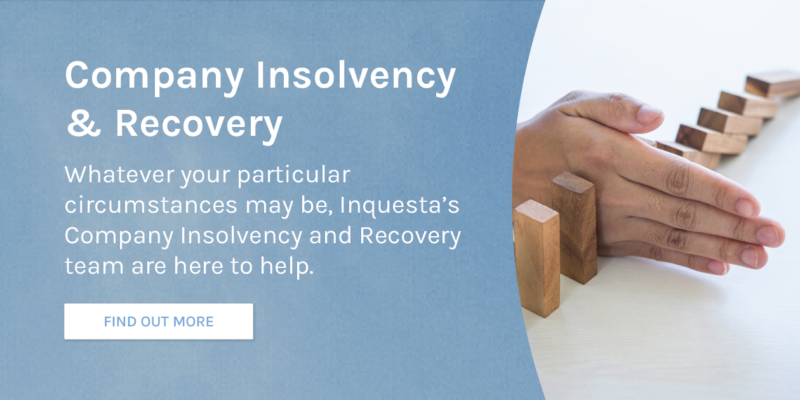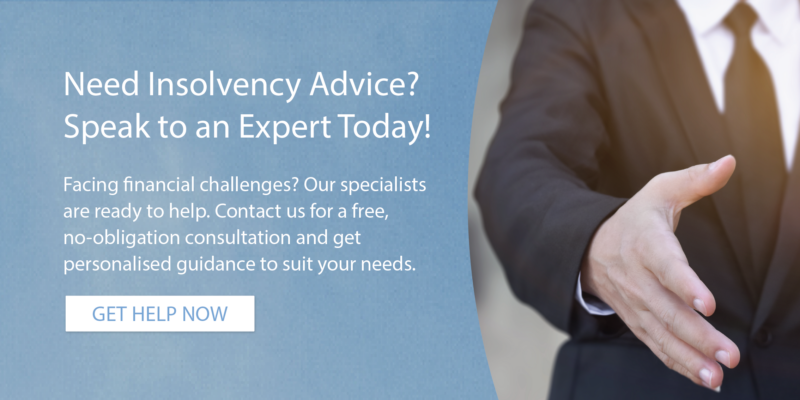Insolvency and bankruptcy, while related, have distinct meanings and, in turn, distinct implications. It’s knowing the subtleties and differences that can help you to navigate your situation, highlight your best options, and make more informed decisions that will best suit you.
This blog aims to delve deep into these important concepts in order to provide you with total clarity on what it means to be insolvent, what happens if you declare yourself bankrupt in the UK, the difference between insolvent and bankrupt, some strategies to avoid both, and more.
Ultimately, financial instability can feel suffocating, whether you’re on your own or are at the head of a business, but it doesn’t have to mean you’re approaching the end of the road. There is hope on the horizon. With the right knowledge and some expert guidance behind you, it’s possible to manage and even overcome these potentially life-altering challenges. Read on to discover the essential information and tools to help you through times of serious financial uncertainty.
What Does it Mean if You are Insolvent?
Insolvency refers to when a company or individual finds itself unable to pay its due debts. While it can refer to both, the term is most often associated with company’s rather than individuals. There are widely seen to be two distinct types of insolvency — balance sheet insolvent and cash flow insolvent.
- Cash Flow Insolvency: When assets are higher than existing liabilities, but cash flow or liquid capital to pay the debts, is lacking
- Balance Sheet Insolvency: If debts outweigh the total value of owned assets.
Insolvency doesn’t necessarily mean that liquidation is around the corner. However, some form of action should be considered necessary immediately. If insolvency issues cannot be resolved, liquidation will be sure to follow.
What Happens if I Declare Myself Bankrupt in the UK?
Bankruptcy is the legal tool to help/allow an individual to clear debts they are unable to pay. Unlike insolvency, in the UK bankruptcy only refers to personal debt, not that of a business. When you declare bankruptcy, your non-essential assets and excess income will be used to pay creditors.
It is common practice that at the end of the pre-agreed bankruptcy period (usually around a year), most if not all debts will be cancelled.
You can opt to file for bankruptcy yourself, or a creditor will also have the ability to file on your behalf if you owe them a sum of £5,000 or more. Once bankruptcy has been filed, the Court will pass an order to confirm your new legal status.
Bankruptcy, while having negative connotations, can actually be incredibly useful for a person facing significant financial issues.
Since, when you are declared bankrupt, your creditors are barred from demanding payment, charging interest, or taking further legal action, the pressure can be relieved somewhat.
Additionally, as mentioned above, while all non-essential assets you own will be put towards paying off debts, any amount outstanding after the bankruptcy period is over can be written off. This can offer the previously debt-laden individual the opportunity for a fresh start.
What’s the Difference Between Insolvency and Bankrupt?
The main difference between insolvent and bankrupt is that insolvency is a financial state of a company or individual, whereas bankruptcy is the legal process whereby an individual is declared insolvent. Bankruptcy comes as a result of insolvency, while insolvency does not automatically result in bankruptcy.
However, these are not the only areas where the similarities between insolvent vs bankrupt end:
Application & Scope:
- Insolvency: As mentioned above, insolvency is a much broader financial state, applying to both individuals and companies. The state of being insolvent can be resolved through various methods, such as restructuring, creditor negotiation, or other insolvency procedures.
- Bankruptcy: On the other hand, bankruptcy is a specific formal legal process that applies to an individual. It is a means for a person who is unable to pay their debts to be relieved from most, if not all of them. Though this is subject to conditions.
Legal Framework:
- Insolvency: Encompasses various different processes and potential outcomes, such as administration, liquidation, or a Company Voluntary Arrangement (CVA) for companies. For individuals, insolvency could lead to bankruptcy, but it does not always have to.
- Bankruptcy: As a court-ordered procedure triggered by an individual or creditor, bankruptcy has a set framework that requires the liquidation of all non-essential assets and the repayment of existing debts, followed by a possible amnesty of remaining debts.
Implications and Consequences:
- Insolvency: Insolvency will not automatically result in a loss of assets. Companies do have the option of exploring potential rescue options. This includes CVAs, business recovery, and more. Options like this can help the company return to solvency without going out of business.
- Bankruptcy: Contrastingly, bankruptcy will be expected to come with a loss of control of personal finances and assets. It can have a serious effect on an individual’s life, including their credit, employment prospects, and more.
Resolution Options:
- Insolvency: A flexible situation for businesses and individuals. Insolvency allows the chance to restructure debts, negotiate with creditors, or seek alternate arrangements that would not involve winding up or bankruptcy.
- Bankruptcy: Typically utilised as a last resort, when there are no other viable options left. This is because it will be certain to include court involvement and a rigid outcome.
Outcome Duration:
- Insolvency: The processes for an insolvent business or individual will vary greatly in length depending on the complexity of the situation and the type of resolution pursued.
- Bankruptcy: The formal bankruptcy process generally lasts for up to a year. However, the after-effects can remain present on your credit and financial standing for far longer. This can sometimes go on for five-plus years.
How Can I Avoid Bankruptcy and Insolvency?
Avoiding bankruptcy and insolvency will require you to be proactive when it comes to financial mismanagement, strategic planning, and maintain as clear an understanding as possible when it comes to your financial situation. So, whether you’re an individual worried about mountain personal debts or a business owner facing cash flow challenges, there are several potential strategies to help you.
Better Understand Your Financial Situation
The first step to avoiding insolvency or bankruptcy is to ensure you have an all-encompassing, comprehensive understanding of your current financial state. This will involve regular reviewing of your financial statements, cash flow, and debts. For companies, this should equate to regular analysis of balance sheets, profit and loss statements, and cash flow forecasts. Individuals should see this as a reminder to track income, expenses, and liabilities.
Create a Budget and Stick to It
A huge step towards ensuring long-term financial health is to create, and adhere to, a regular budget. This is crucial for both individuals and businesses alike.
Your budget should take into account all necessary expenses while prioritising any possible debt repayment. For business owners, this spells controlling overhead costs, cutting non-essential expenses, and ensuring that cash flow is able to cover operational costs and debt obligations.
Once you’ve set your budget, the task is not complete. You should be regularly reviewing and adjusting your budget if you want to stay on track.
Negotiate with Creditors Early
Do you have any creditors? Are you worried about meeting debt obligations? If so, it is essential that you communicate this with them as early as possible. While not true of all, it is a good rule of thumb that creditors will be open to negotiating repayment plans or extending terms for proactive creditors as this minimises defaults and non-payments.
This step can make your repayment schedule more manageable, lead to reduced interest rates, or even afford you a period of relief if your credit is amenable.

Consider Professional Advice
If you’re faced with the risk of insolvency or bankruptcy, seeking advice from an insolvency expert can be invaluable. Professionals will be able to help you to better understand the options available to you, whether that means restructuring your debt, negotiating with creditors, or exploring alternate solutions, such as Company or Individual Voluntary Arrangements (IVA).
Inquesta: Your Trusted Partner Towards Financial Security
Facing financial distress head-on can be one of the most daunting experiences for individuals and businesses alike. Understanding the important distinction and difference between insolvent and bankrupt is a first step you can make towards taking full control of your financial situation.
However, when pressure mounts and the financial challenges seem insurmountable, Inquesta’s expert team is here to help provide you with the support and guidance you need. We are highly experienced specialists in all things insolvency and bankruptcy, and beyond. We understand the complexities that arise during times of financial distress and are well-equipped to help you explore all possible avenues open to you. Our approach is to always find the best possible solution to protect our clients’ assets and financial future.
Don’t let uncertainty define your future. With Inquesta by your side, you have a partner on hand that’s 100% dedicated to not only help you avoid bankruptcy, but overcome potential insolvency issues and set yourself up for future success. Our tailored, expert advice can make all the difference in turning a bad situation around, protecting your firm against potential future issues, securing your personal finances should you be in a tricky spot, and even closing your company down should it get to that. Reach out to us today and learn more about how we can help you.




